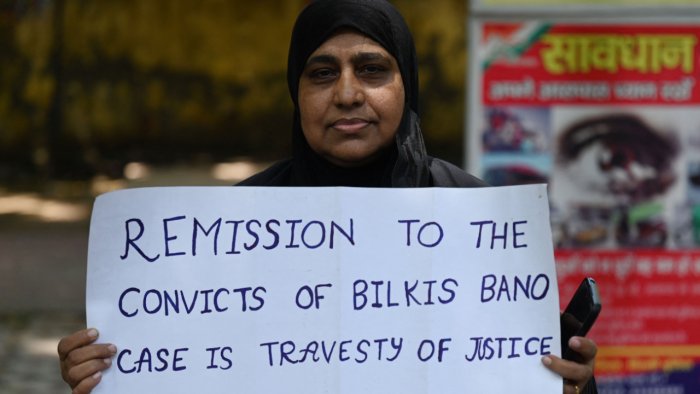The release of 11 convicts serving life imprisonment in the Bilkis Bano gangrape and murder case from the 2002 Gujarat riots is a sad commentary on the criminal justice system that seems to have bent over backwards to please the ruling dispensation. The way the convicts were set free by the BJP government in Gujarat, given sweets and hero’s welcome, prompted the victim of the unspeakable barbarity to lament: “Is this how justice ends?” The National Human Rights Commission is likely to take up the issue for discussion, according to a report. But that hardly inspires confidence that justice will be done or seen to be done. The 11 men had been convicted of raping Bilkis, murdering her three-year-old child and participating in the killing of 13 others of the family. Their release is not only a miscarriage of justice, but government endorsement of heinous crimes seemingly taking advantage of technical niceties. This is a new ominous trend of the country’s system of justice.
The Bilkis Bano case is an illustration of the abysmal depths to which criminality and communal frenzy in the country have fallen and one which the Establishment gleefully endorses. Even after knowing the victim was pregnant, the criminals raped her, smashed her child to death and massacred the whole family. It speaks volumes for the courage of Bilkis that she did not succumb to threats, fear of social stigma and persecution and left no stone unturned to get justice. The NHRC, under former Chief Justice of India JS Verma, had met her when he visited a relief camp in Godhra in March 2002 and appointed senior advocate and former Solicitor General Harish Salve to represent her before the Supreme Court. The apex court ordered a fresh probe by the Central Bureau of Investigation and subsequently the trial was transferred from Gujarat to Bombay. Bano’s case was the only Gujarat riots-related case that was investigated afresh by the CBI. On January 21, 2008, CBI special court judge UD Salvi convicted 13 accused, sentencing 11 to life imprisonment on the charge of gangrape and murder. In May 2017, the conviction was upheld by the Bombay High Court. In 2019, the Supreme Court had awarded compensation of Rs 50 lakh to Bano — the first such order in a case related to the 2002 riots. While awarding the compensation, the Bench of the then Chief Justice of India Ranjan Gogoi and Justices Deepak Gupta and Sanjiv Khanna observed, “What should not have happened has happened and the state has to give compensation.”
What is of grave concern is the way the Gujarat government handled the case while granting remission to the convicts. This is not just any sexual offence case. The criminality has so many layers including communal strife and politics. Bilkis Bano has vented her frustration and fear after the release of the convicts and said she has trusted the highest courts in land and the system. But, she regrets she is slowly learning to live with her trauma as the release of the convicts has snatched peace from her and shaken her faith in the justice system.
That her fears are not baseless is clear from the fact that for the past few years several prosecution witnesses had, time and again, complained to the state administration and senior police officers that some of the convicts had obtained parole several times on flimsy grounds, including house warming parties, only to live in comfort outside the jail and continue to threaten them with dire consequences if they did not withdraw their statements in the court. But the complaints had gone unattended.
This is a sorry state of affairs. The state appears to be siding with hardened criminals infected with communal hatred. The Supreme Court, by allowing the state government to set up a panel that was empowered to decide on the permanent release of the convicted men, has also seemingly erred in a grave manner. All these events cast a dark shadow of suspicion on both the judiciary and the government.
The voting citizen seems to be have become helpless with no one to turn to for justice.
